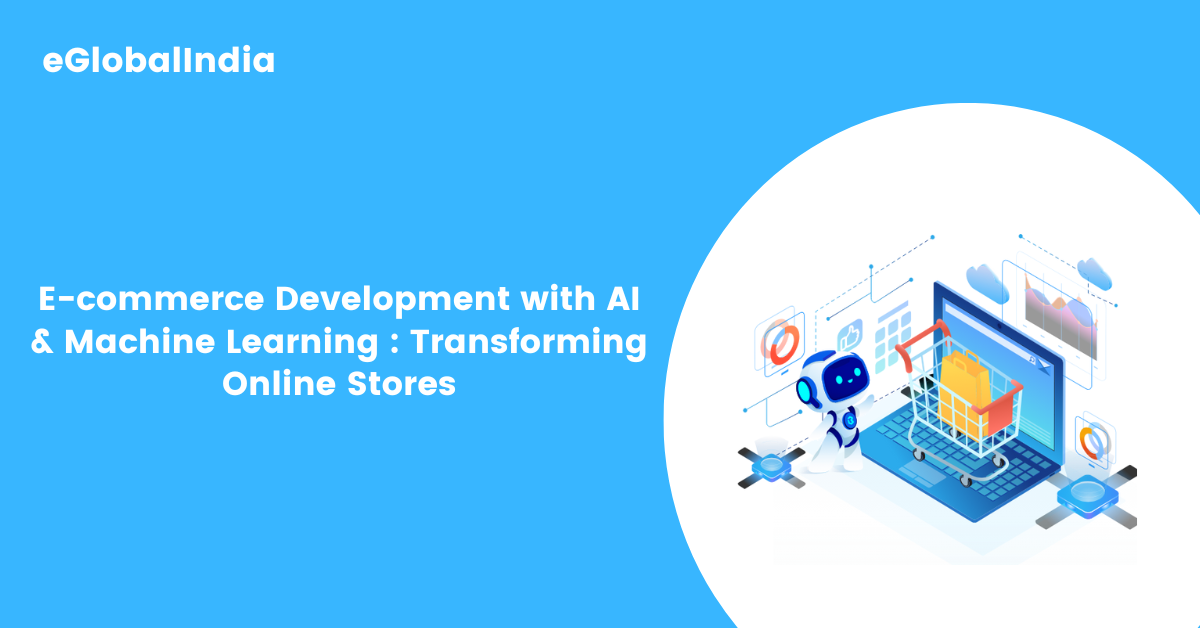

The eCommerce industry has evolved tremendously over the past decade, with businesses adopting cutting-edge technologies to enhance user experiences, streamline operations, and boost sales. Among these innovations, AI and ML emerge as transformative forces reshaping the landscape. These technologies are revolutionizing how online stores operate, enabling businesses to automate tasks, make data-driven decisions, and offer personalized shopping experiences that drive customer loyalty.
This comprehensive guide explores how AI and ML are transforming eCommerce development, the benefits they offer, key applications, and future trends.
AI and ML are reshaping the eCommerce landscape by introducing automation, predictive analytics, and intelligent decision-making. These technologies analyze vast amounts of data to uncover patterns, make accurate predictions, and improve customer interactions. Here’s how they are playing a crucial role in eCommerce development:
AI-powered recommendation engines analyze customer behavior, past purchases, and browsing history to offer highly personalized product suggestions. This enhances user engagement and boosts conversion rates. Personalized experiences make customers feel valued, increasing the likelihood of repeat purchases and brand loyalty.
Examples :
By leveraging machine learning algorithms, businesses can understand customer preferences better and tailor their marketing strategies accordingly. AI-driven content recommendations further enhance the user journey by displaying relevant products, blog posts, and promotions based on browsing patterns.
Chatbots powered by AI provide 24/7 customer support, resolving queries instantly and enhancing user satisfaction. These bots simulate human conversations and handle order tracking, FAQs, and personalized recommendations, significantly reducing customer wait times.
Benefits :
Additionally, AI-powered virtual assistants, such as Alexa and Google Assistant, are making voice-based interactions more seamless. These assistants help customers place orders, check delivery statuses, and receive product recommendations using simple voice commands.
AI-driven search engines in eCommerce platforms help users find products faster by understanding natural language queries. Visual search enables customers to upload images to find similar products, improving the overall shopping experience.
Example :
Smart search engines use NLP (Natural Language Processing) to interpret user intent, ensuring highly relevant search results. This eliminates frustration and helps customers find what they need quickly.
AI analyzes competitor pricing, demand trends, and historical data to dynamically adjust product prices in real-time. This ensures competitive pricing while maximizing profits, helping businesses remain ahead in the market.
Key Features :
Retail giants like Walmart and Target utilize AI-powered pricing engines to adjust prices dynamically based on demand shifts, competitor strategies, and economic factors.
AI algorithms detect unusual transactions and flag potential fraudulent activities. Machine learning models analyze user behavior to identify suspicious actions and prevent financial fraud, ensuring secure transactions.
How it Works :
With eCommerce fraud increasing globally, AI-driven fraud detection tools provide an added layer of security, safeguarding both businesses and consumers.
AI helps eCommerce businesses optimize inventory levels, predict demand fluctuations, and automate warehouse operations. By analyzing trends and historical data, AI ensures that businesses maintain the right stock levels, reducing inefficiencies and costs.
Benefits :
AI-driven robotics in warehouses further streamline operations by automating tasks such as picking, sorting, and packaging orders, reducing reliance on human labor.
AI-powered sentiment analysis tools evaluate customer reviews and social media mentions to understand consumer opinions and improve brand strategies. This allows businesses to adjust their products, services, and marketing campaigns based on real-time customer feedback.
Example :
By monitoring sentiment trends, businesses can proactively address customer concerns, refine product offerings, and enhance overall satisfaction.
Voice search is becoming increasingly popular in eCommerce. AI-powered voice assistants like Alexa, Google Assistant, and Siri enable users to shop using voice commands, making online shopping more convenient.
Impact on eCommerce :
AI-powered chatbots, personalized recommendations, and voice assistants improve user interactions, making shopping more engaging and interactive.
AI-driven UX improvements include predictive text searches, personalized content, and intuitive navigation, leading to a seamless and user-friendly shopping experience.
AI-driven recommendations and dynamic pricing strategies encourage higher conversion rates and increased revenue by presenting customers with products they are more likely to purchase.
AI enables businesses to accurately reach their ideal audience. AI-powered tools analyze customer behavior to create tailored marketing campaigns that drive engagement and sales.
AI-powered automation reduces manual tasks, minimizes human errors, and optimizes business operations, leading to significant cost savings and improved efficiency.
Businesses that adopt AI gain an edge over competitors by offering superior customer experiences, optimized pricing, and efficient logistics, making them stand out in the crowded eCommerce space.
Advanced AI algorithms will deliver hyper-personalized experiences, tailoring every aspect of the customer journey to individual preferences and behaviors.
AR and AI will merge to offer virtual try-ons, 3D product visualization, and interactive shopping experiences, enhancing the way customers engage with products online.
AI-driven drones and robots will revolutionize eCommerce logistics, making deliveries faster and more efficient, while smart warehouses will optimize inventory management.
Combining AI with blockchain technology will enhance security, transparency, and trust in eCommerce transactions, reducing fraud and ensuring data integrity.
AI-powered content generation tools will create compelling product descriptions, enhancing SEO and user engagement, and reducing the workload for eCommerce businesses.
AI and Machine Learning are transforming eCommerce development, creating smarter, more efficient, and personalized shopping experiences. As AI continues to evolve, businesses that embrace these innovations will stay ahead of the competition, drive higher sales, and deliver exceptional customer experiences. Investing in AI-powered eCommerce solutions is the key to long-term success in the digital marketplace.
Upgrade Your Business with AI-Powered Innovation – Connect Us!

© 2017 All rights reserved.